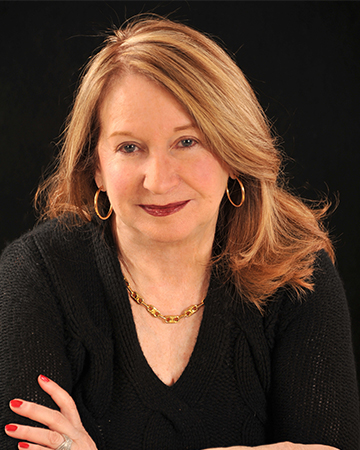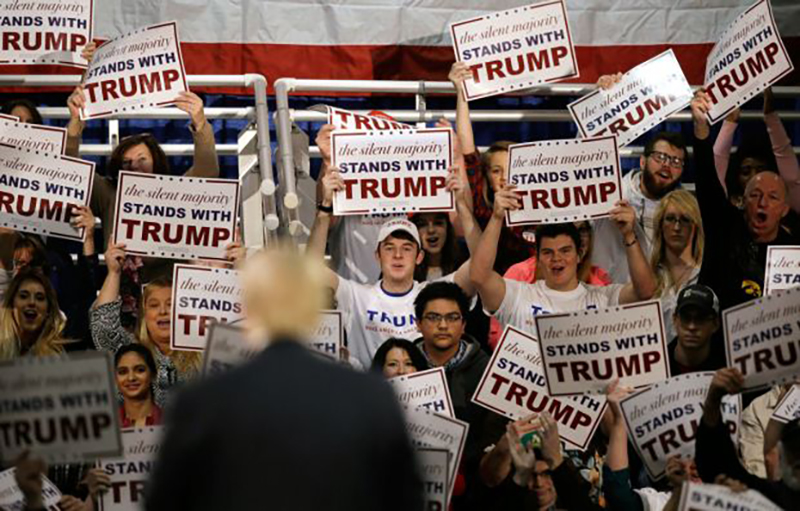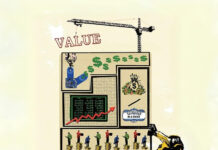Impossible to make much sense of what happened – President-elect Donald Trump – so soon after the fact. But when the history of this moment is written, it will have to presume a systemic perspective. It will have to account not only for leaders, but also for followers, and for contexts.
This is a brief first pass.
Leaders
• Donald Trump. Sui generis. The American body politic has never seen anyone like him: a businessman and barker with zero political experience who, by dint of his outlandish, outrageous, and ferocious attacks on the status quo, was ultimately catapulted to the top of the greasy pole.
• Hillary Clinton. Sui generis – but only in so far as she was a woman playing in what up to now has been a man’s game. In every other way she was the opposite of the new and different. In fact, she was excessively familiar: wife of a husband who, for all his gifts, had years ago tarnished the nation’s highest office. And a longtime political player in her own right who, for all her gifts, had been tainted with charges of deception and corruption.
• Barack Obama. Preternaturally popular among the American people in the waning days of his presidency. Nevertheless, a black man in a sea of angry white voters – who, to boot, was responsible for the Affordable Care Act, “Obamacare”, which just weeks before the election jacked up premiums to the point where “affordable care” was anything but.
• Mike Pence. A superior political cipher. He looked the part. Sounded the part. And played the part – perfectly. Subsuming his own political persona to Donald Trump’s, Pence spent the last several months proving he was to the manor born – the vice president’s manor. He was loyal to fault, bereft of his own persona, and when called upon to perform did so by being beautifully bland, not a single gray hair on his carefully coiffed head ever out of place.
• Tim Kaine. The invisible man. Chosen by Hillary Clinton for a range of traits and characteristics, including being a Catholic, a pragmatist, and a speaker of Spanish. But, Kaine first disappointed, then disappeared. Never touted to full effect, once he lost the vice presidential debate to his Republican counterpart, he was hidden behind a scrim
• Paul Ryan. A grievous disappointment to those who once thought that he might be an exception to the general rule – that he might have the courage of his convictions. Clearly distrustful of his party’s nominee, possibly even repelled by him, Ryan chose to remain mute on the man, silent to a fault, straddling the wavering line between retaining a modicum of personal political independence and party loyalty.
[ms-protect-content id=”9932″]Followers
• Angry and frustrated American voters. Angry at and frustrated by Washington – its perceived inability to fix what’s broke. Its perceived inability to improve our lot, repair our relations with each other and the rest of the world, and perform the most rudimentary of government functions, providing safety and security.
• Angry and frustrated American voters. Angry at and frustrated by the establishment, by the leadership class – its perceived corruption, collusion, deception, and inefficacy. The leadership class includes not just political leaders, but corporate leaders, educational leaders, religious leaders – you name it. Over fully four decades, the American people have judged leaders of all stripes increasingly harshly.
• Angry and frustrated American voters. Angry at and frustrated by others they perceive as outsiders. Angry at and frustrated by others they perceive as usurping. Angry and frustrated by others they perceive in ideological opposition. Angry and frustrated by others they perceive as being, in some way, un-American.
• Depressed and disappointed American voters. Depressed at and disappointed by the vanishing American Dream. The vague but palpable promise that they will be better off than their parents, and their children better off than they. The fantasy that America really is a shining city on a hill. The notion that America truly is an exception. The now constantly growing gap between what is imagined and what is real.
• Depressed and disappointed American voters. Depressed at and disappointed by their failure to make headway. Their failure since the 1970’s to shrink the distance between them and those more favourably situated. The growing gap between the haves-a-great-deal and the haves-much-less. The fear of being saddled with debt when young – and the fear of being broke when old. The fear of being displaced by technology, by robots, by artificial intelligence.
• Depressed and disappointed American voters. Depressed at and disappointed by the rapidity of changes in the culture as frightening as they are intimidating. Changes in what is permissible and what is not. Changes in attitudes and opinions that make out of political correctness what some perceive as a fetish. Changes in relations between those in positions of authority, particularly perhaps the police, and those who are not.
• Depressed and disappointed American voters. Depressed at and disappointed by their own deep divisions. By leaders’ inability to compromise in the interest of the general welfare. By our own inability to speak with and to each other in a way that is reliably civil. By our own continuing inability to find common ground on some of the most contentious of contemporary issues.
Contexts
• The global context – within which the US is situated. Liberal democracies are running into trouble the world over. What happened yesterday in the US is not, in other words, unique. Countries such as France, Poland, the Netherlands, Denmark, Hungary, Austria, and Australia all have been dealing with growing tendencies to nationalism, nativism, and populism.
• The global context – within which the US is situated. The shock hard on the heels of yesterday’s election is also not new. It’s similar to what happened just recently with Brexit, when the Brits were stunned to discover the morning after the night before that they had voted not to remain in the European Union, but to leave it.
• The global context – within which the US is situated. American voters perceive – correctly – that America’s position in the world has recently been weakened. Examples: We stood by and effectively did nothing while Russia seized Crimea, while Russia let loose bombs on Aleppo, and while Russia hacked into the e mails of the Democratic National Committee. We stood by and effectively did nothing while North Korea persisted an outlier, while further developing its nuclear arsenal. We stood by and effectively did nothing while Europe transformed from being relatively strong and united to being relatively weak and fractured.
• The domestic context. Media madness. Old media, new media, social media. Information saturation. Fractured, fractious, ceaseless discourse. Anonymity providing cover for cyber-bullying and foulmouthed bad-mouthing. Coarsening of the public discourse. Diminishing civic-mindedness. Further dividing the body politic by preaching to the choir.
• The domestic context. The colour of money – big money. The impact of so much money in the hands of so few. Big money as American as motherhood and apple pie. Big money as power, and big money as influence. The infiltration of big money into near every corner of American life and the impact of big money on near every aspect of American life – money in business, money in politics, money in education, money in sports, money in art, money in you name it.
• The domestic context. Interests – interest groups, special interests, interests that favour the privileged few over the ordinary many. By every measure there is more lobbying in the present than there was in the past – and the political and financial stakes are far higher. There are some fifteen to twenty thousand interest groups in the Washington area alone – outside the nation’s capital are some two hundred thousand more. Where does this leave the rest of us, those of us not endowed with money or power?
• The domestic context. More prying, more license, more technology, more access – more closing the distance between leaders and led. Think of what we now know about Hillary Clinton and Donald Trump: secrets about sex, secrets about servers, secrets about spouses, secrets about staff, secrets about wrongdoing, secrets about money, secrets about personal and professional proclivities, secrets about what was done to whom, and said to whom, and how and when and where and why.
I could go on. And once the shock has worn off maybe I will.
Meantime the shock itself should be subject to scrutiny. Why in a world with such an abundance of information was so much information so wrong? Why did most of the experts tell us one thing when another turned out true?
This article was first published on Barbara Kellerman’s blog on 9 November 2016
[/ms-protect-content]
About the Author
 Barbara Kellerman is the James MacGregor Burns Lecturer in Public Leadership at Harvard University’s John F. Kennedy School of Government. She was the Founding Executive Director of the Harvard Kennedy School’s Center for Public Leadership, and she has held professorships at Fordham, Tufts, Fairleigh Dickinson, George Washington, Uppsala, and Dartmouth.
Barbara Kellerman is the James MacGregor Burns Lecturer in Public Leadership at Harvard University’s John F. Kennedy School of Government. She was the Founding Executive Director of the Harvard Kennedy School’s Center for Public Leadership, and she has held professorships at Fordham, Tufts, Fairleigh Dickinson, George Washington, Uppsala, and Dartmouth.


































